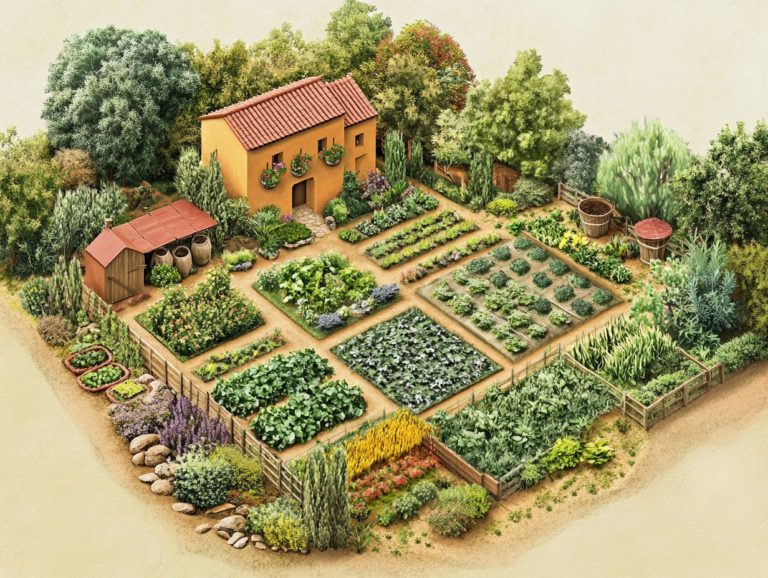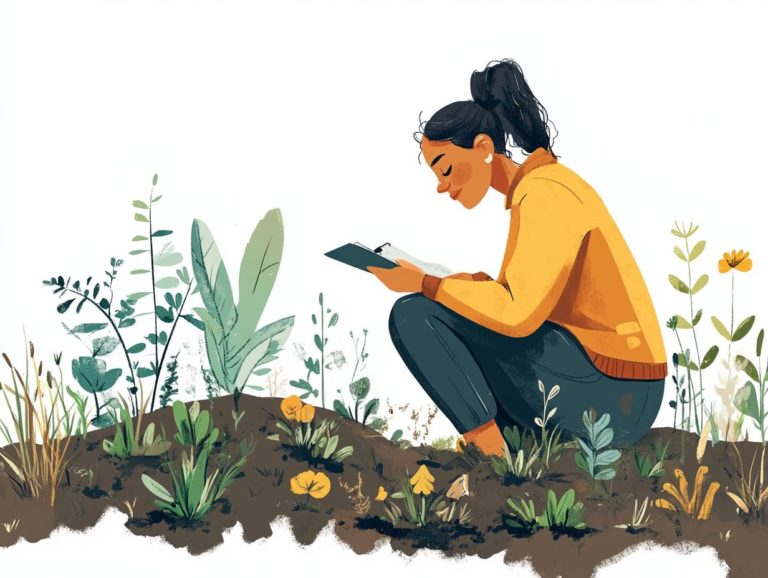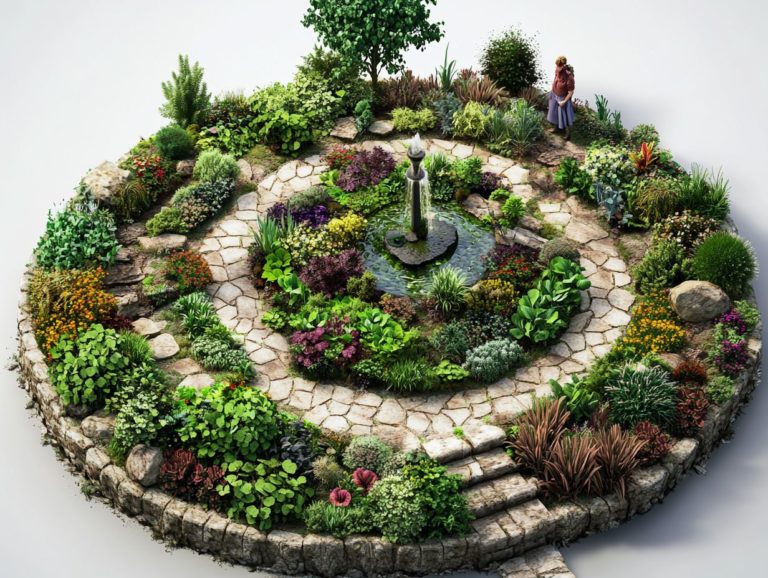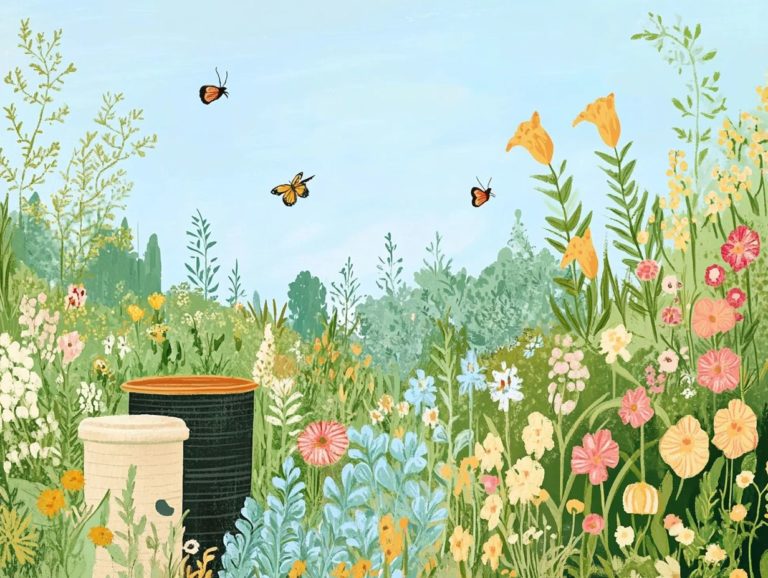What is the Importance of Ethics in Gardening?
Gardening transcends the simple act of planting seeds and caring for plants; it embodies a profound responsibility towards both the environment and the community.
This exploration delves into the essential ethics of gardening, highlighting the significance of understanding its environmental impact while embracing social responsibility. You will discover sustainable practices, the merits of organic methods, and the importance of being conscientious about chemical use.
Join in as you uncover how ethical gardening can transform your green spaces and enrich your life! By adopting ethical gardening practices, you cultivate not only a healthier ecosystem but also boost your mental and emotional health.
Contents
- Key Takeaways:
- The Basics of Gardening Ethics
- Environmental Impact of Gardening
- Social Responsibility in Gardening
- Ethical Considerations in Gardening Practices
- Benefits of Ethical Gardening
- Frequently Asked Questions
- What is the Importance of Ethics in Gardening?
- Why is it important to follow ethical principles in gardening?
- What are some examples of ethical gardening practices?
- How does ethical gardening benefit the environment?
- What role do ethics play in sustainable gardening?
- Can ethical gardening also benefit human health?
Key Takeaways:
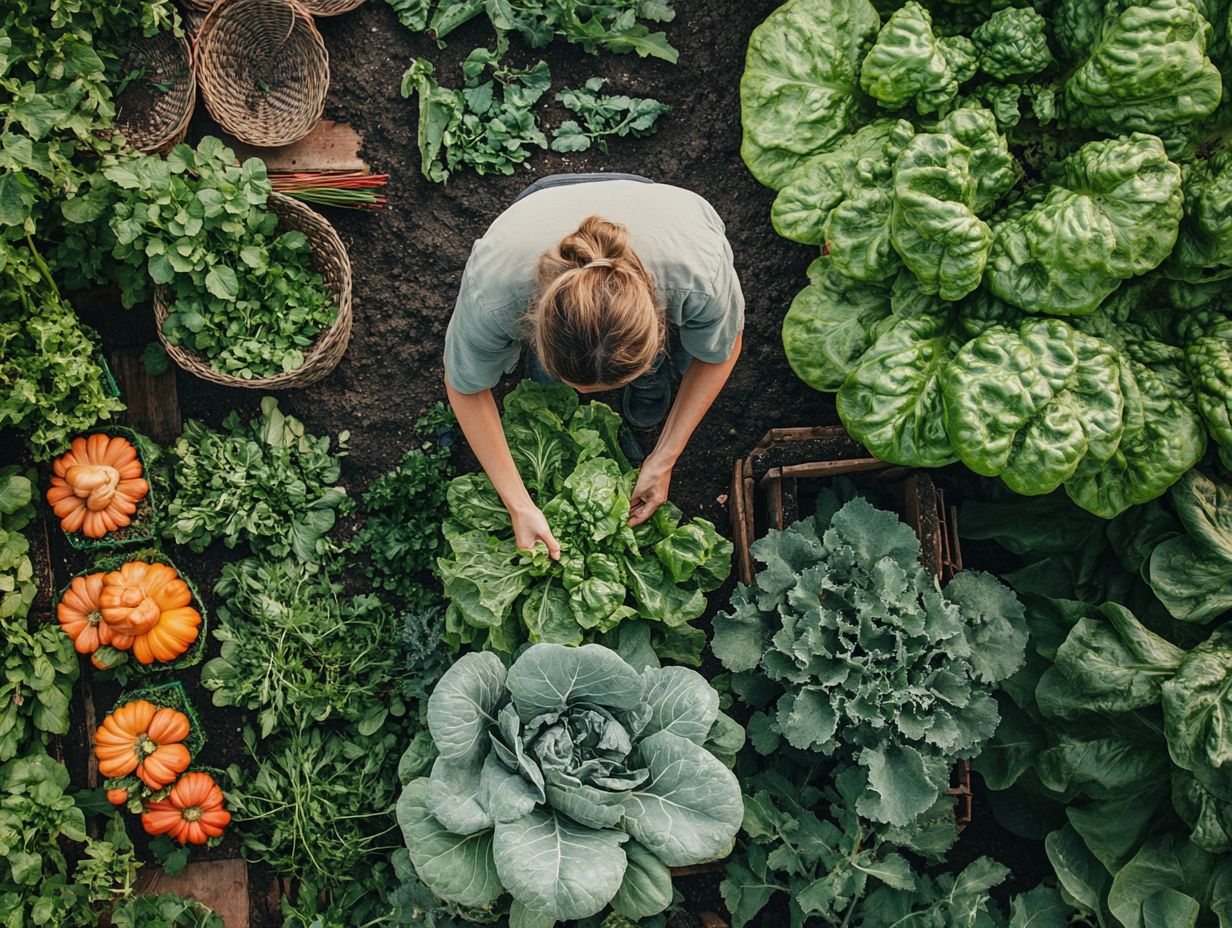
- Practice ethical gardening! Be mindful of the impact on the environment and community.
- Choose organic and sustainable gardening methods! They prioritize the well-being of plants, animals, and humans.
- Ethical gardening benefits the environment and promotes mental well-being for gardeners!
The Basics of Gardening Ethics
Gardening ethics form the essential foundation for anyone looking to cultivate their green spaces with a sense of responsibility. This approach intertwines principles of environmental awareness, ethical decision-making, and sustainable practices.
It’s not merely about planting flowers; it s about achieving a delicate balance of biodiversity the variety of life in a particular habitat embracing community gardening, and recognizing the natural benefits that foster healthier ecosystems.
Visionaries like Benjamin Vogt highlight the significance of incorporating native plants. They also emphasize grasping the implications of climate change on our gardening practices. By doing so, you ensure that your gardening journey embodies a commitment to deep ecology rather than superficial concerns.
Defining Ethics in Gardening
Defining ethics in gardening goes beyond simple rules; it s about embracing a commitment to environmental philosophy and making moral choices that shape your interactions with nature and the communities around you.
This commitment invites you to reflect on how your gardening practices can either nurture sustainability or inadvertently harm the ecosystem. Environmental philosophy highlights the interconnectedness of all living things, urging you to consider the impact of your actions on local biodiversity.
The significance of community involvement cannot be overstated. When individuals come together to share resources and knowledge about gardening, they cultivate not just plants but also relationships that foster a sense of collective stewardship.
Your personal values play a pivotal role as well. Each gardener infuses their beliefs about sustainability, heritage, and food justice into their practices, creating a gardening ethic that resonates far beyond the soil. This fosters a more harmonious relationship with the earth.
Environmental Impact of Gardening
The environmental impact of gardening reaches well beyond the visual appeal of a meticulously maintained yard; it is integral in combating climate change, boosting biodiversity, and nurturing soil health and wildlife habitats through ecological gardening practices.
As a gardener, you hold the power to influence how your practices either alleviate or worsen challenges such as climate disruption and biodiversity decline. By adopting ecological gardening principles, you can cultivate landscapes that enhance the beauty and functionality of your environment while making a meaningful contribution to the broader ecosystem.
How Gardening Can Affect the Environment
Gardening has the remarkable potential to influence the environment. It impacts local ecosystems through mindful practices that enhance biodiversity.
Incorporating native plants into your garden cultivates a vibrant habitat. This attracts essential pollinators like bees, butterflies, and hummingbirds.
A well-designed garden can act as a buffer against stormwater runoff. It improves water quality and helps prevent flooding.
By making sustainable choices, you engage in climate change mitigation. You help lower the carbon footprint of your community.
Social Responsibility in Gardening
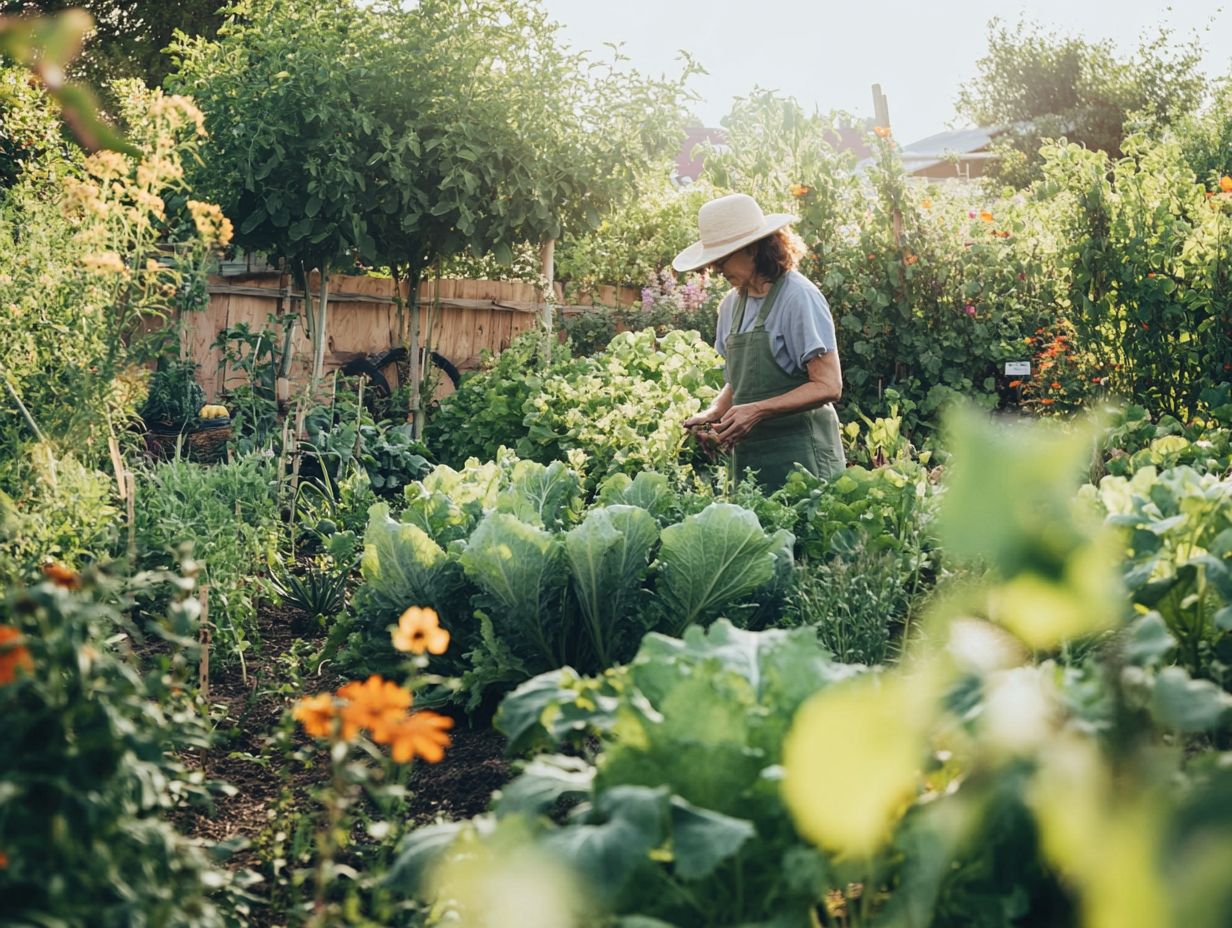
Social responsibility in gardening involves your ethical obligations to the community. It promotes practices that emphasize inclusivity and sustainability.
This responsibility includes community gardening initiatives. These initiatives nurture cultural diversity and environmental justice.
By recognizing your role as a gardener, you make informed choices. These choices enhance ecological health and social well-being.
Considering Community and Human Impact
Understanding the community and human impact of gardening reveals deep connections. Your gardening choices relate closely to the social fabric of your neighborhood.
This relationship shows how your ethics influence not just your practices. They also contribute to a collective responsibility.
When you engage in sustainable gardening, you nurture plants and foster strong community bonds.
These practices promote a commitment to environmental stewardship. They create spaces that celebrate cultural diversity.
By advocating for equitable access to gardening resources, you support environmental justice. This promotes health and well-being for all residents.
Ethical Considerations in Gardening Practices
When considering ethical implications in gardening, examine your approaches carefully. This is especially important in organic and sustainable gardening.
These practices reduce your carbon footprint and environmental impact. Reflecting on the ecological consequences of your choices is imperative.
By opting for soil health and biodiversity practices, you help wildlife habitats thrive. You’re contributing to a harmonious relationship with the earth.
Organic Gardening and Sustainable Methods
Organic gardening and sustainable methods emphasize the variety of plants and animals. They enhance the health of your plants and surrounding ecosystems.
Embracing techniques like crop rotation, companion planting, and natural pest control creates a nurturing environment. This supports a variety of flora and fauna.
These strategies enrich soil health using organic amendments like compost and cover crops. They minimize adverse effects on local wildlife.
Organic gardening promotes sustainability by reducing dependence on synthetic fertilizers and pesticides. These can harm local ecosystems.
Such practices foster a harmonious relationship with your surroundings. The result is resilient landscapes and flourishing habitats!
Responsible Use of Pesticides and Fertilizers
Using pesticides and fertilizers responsibly is crucial for your garden’s health and the planet. This ensures that your practices align with ethical standards while minimizing environmental impact and supporting vital ecological services.
Explore organic alternatives that enhance plant health without jeopardizing the well-being of beneficial insects or surrounding wildlife. Techniques like integrated pest management a method that combines different strategies to manage pests naturally not only emphasize the use of natural products but also promote biodiversity. This creates an environment where pollinators can thrive.
It s essential for you to stay informed about safe application methods and timing. This knowledge can significantly reduce unintended harm. By prioritizing sustainable practices, you can ensure that future generations inherit landscapes rich in flora and fauna, while maintaining both productivity and aesthetic appeal.
Benefits of Ethical Gardening
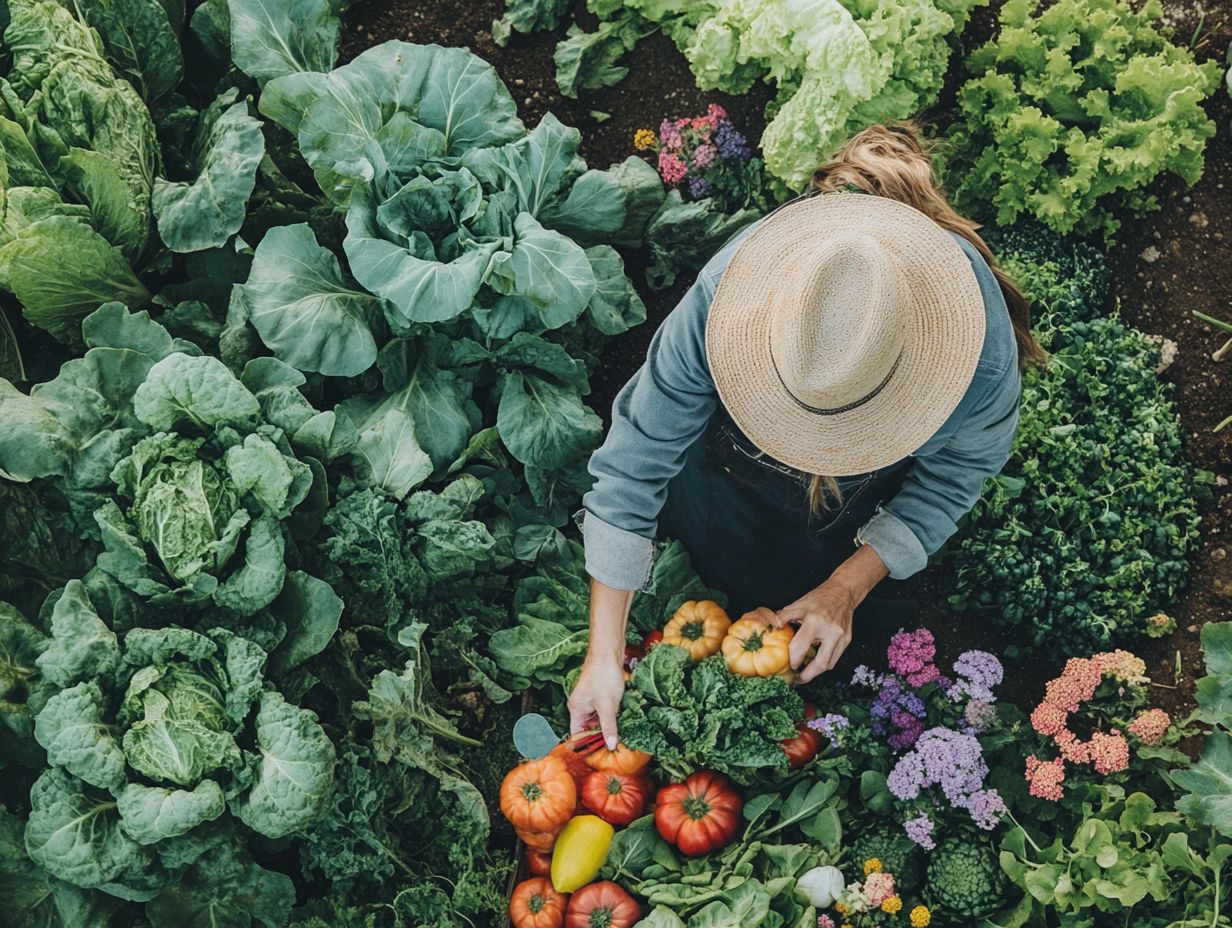
The advantages of ethical gardening go far beyond creating beautiful landscapes; they deeply enrich your community and strengthen your emotional ties to nature. Engaging in this practice fosters a profound sense of purpose and well-being.
By adopting sustainable techniques, you not only improve the ecological health of your surroundings but also nurture social connections and reinforce community bonds. You’re advocating for environmental justice in your neighborhood.
Positive Impact on the Environment and Community
The positive impact of ethical gardening on both the environment and the community is truly remarkable. By choosing to cultivate native species, you enhance biodiversity while supporting local plants, enriching the ecological integrity of your neighborhood.
When you opt for native plants, you create natural habitats that attract a variety of pollinators, such as bees and butterflies. This ultimately contributes to the overall health of local ecosystems. Community gardens serve as vibrant spaces where residents can come together, sharing knowledge about sustainable practices and the myriad benefits of biodiversity.
Participating in workshops and volunteer days focused on environmental stewardship can instill a profound sense of ownership and pride in your community. This collaborative spirit strengthens community ties while highlighting the importance of protecting the region’s flora.
The symbiotic relationship between nature and community interaction underscores the essential role ethical gardening plays in paving the way for a sustainable future.
Mental and Emotional Benefits for Gardeners
The mental and emotional benefits of gardening are truly remarkable. You can forge deep connections with nature, enhance your overall well-being, and discover a profound sense of purpose throughout your gardening journey.
Engaging in these activities becomes a form of therapy. You immerse yourself in the rhythms of life as you nurture plants and watch them thrive. Gardening cultivates mindfulness, allowing you to appreciate the present moment. It also provides an outlet for your creativity and self-expression.
As you tend to your green spaces, you ll often find joy in the growth not just in your garden, but within yourself as well. Participating in community gardens can further enrich your experience, fostering strong social bonds and creating a sense of belonging and collaboration that enhances your emotional landscape.
Frequently Asked Questions
What is the Importance of Ethics in Gardening?
So, why do ethics matter in gardening? It’s all about making choices that benefit both you and the environment. Ethics in gardening refers to the moral principles and values that guide one’s actions and decisions. By understanding the importance of sustainability in gardening, we can ensure the well-being of both humans and the environment.
Start your journey towards ethical gardening today! Join a local workshop or community garden!
Why is it important to follow ethical principles in gardening?
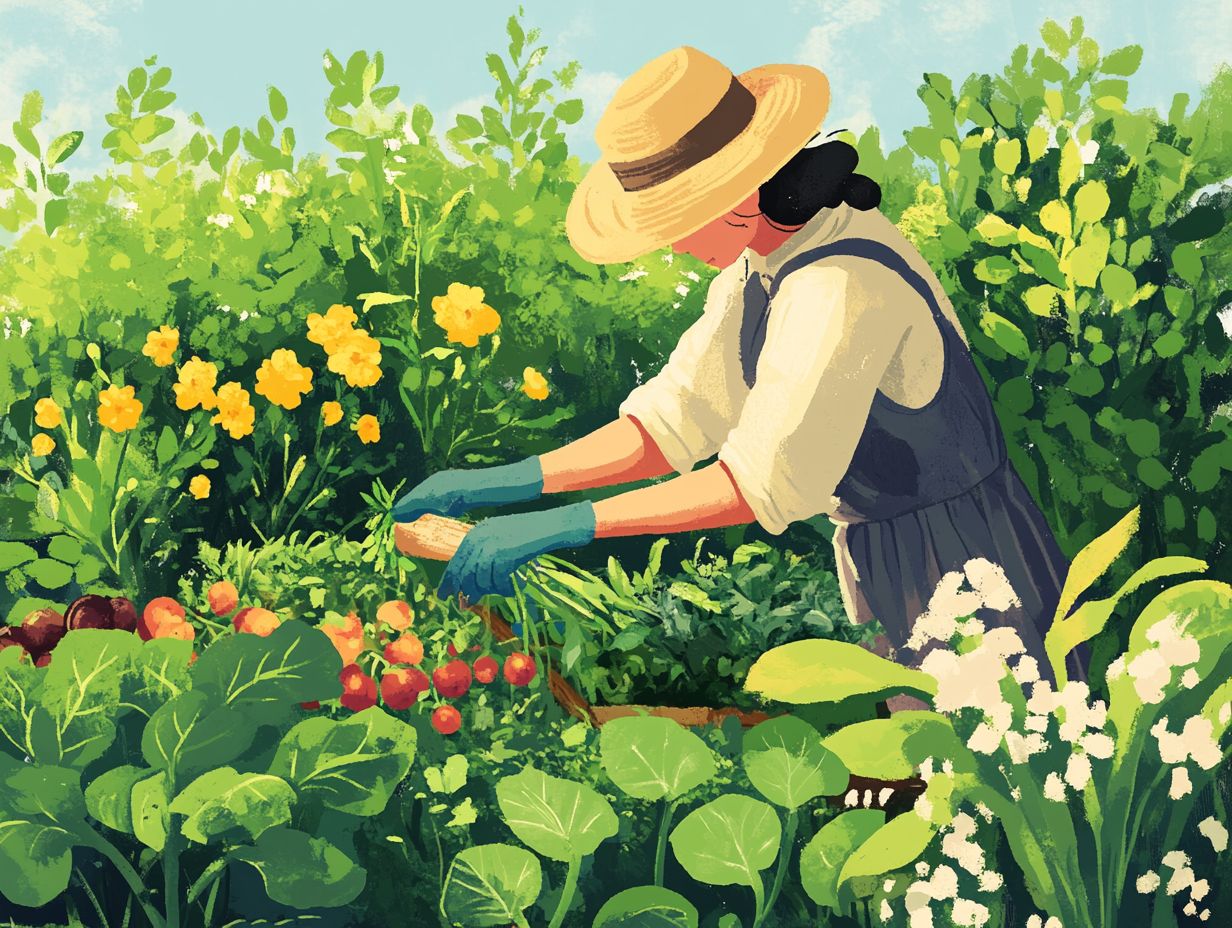
Following ethical principles in gardening helps minimize the negative impact on the environment. It supports eco-friendly gardening and encourages respect for nature and its resources.
What are some examples of ethical gardening practices?
Examples of ethical gardening practices include using organic and natural methods instead of harmful chemicals. Conserving water and energy, respecting wildlife and their habitats, and using locally sourced materials and plants are also key practices.
How does ethical gardening benefit the environment?
By practicing ethical gardening, you can help reduce pollution and boost biodiversity making a real difference! These practices also help maintain a healthy ecosystem for plants and wildlife.
What role do ethics play in sustainable gardening?
Ethics play a crucial role in sustainable gardening, guiding actions towards a harmonious and balanced relationship between humans and the environment. It ensures that gardening practices do not deplete resources or harm the ecosystem.
Can ethical gardening also benefit human health?
Yes, ethical gardening practices benefit human health by providing access to fresh and organic produce. They also reduce exposure to harmful chemicals and promote physical activity and mental well-being through gardening activities.

